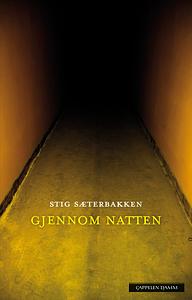Take a photo of a barcode or cover
When the author cannot help but articulate.
To what extent is the author doing the right thing when he commits words to an idea which resists him. (The Idea, perhaps, balks at "commitment" in its adumbration of the mental asylum and flees.) What rough beast then results from the writer's compulsive technical Articulation. (I mean to over-write "Articulate" with the anatomical sense: connections between structures, flexion, extension at a joint, fixation, and the implied separation/disarticulation which precipitates a medical emergency.)
Saeterbakken's writing project appears to be motived by a horrible sensation without a voice, which inspires the prurient urge to produce the (lacrimal) emission. The novel is constructed from-back-to-front with this intention in mind. A lachrymal feeling is in search of a sad image which can excite it to produce more tears (similar to the lascivious feeling in search of the repetition of a prurient image), which appears to be the paradise-(innocence)-lost image of the child cowboy. We must contrive a way to tell this image to an interested third party (even better if they are an inverted family, an Other woman and with child). It goes without saying the child must now be dead, in part through our negligence, such that we can extract maximal pathos. We almost forget this scene, in which the son slowly ascends the stairs with a shiver of excitement, is impossible because we are already late for soccer practice (a practice at which he is now sure to excel due to the articulation of many extra weepy eyes and long legs). Likewise, narrative fixation on a "greatest fear," is intended to be realized as a kind of mantra within oneself - a slippery pebble of a feeling in search of a word, evading further analysis, which is articulated to walk on its hands.
We are so arrogant that we think we are [writing a novel] whereas we are not even capable of living, —Bernhard
To what extent is the author doing the right thing when he commits words to an idea which resists him. (The Idea, perhaps, balks at "commitment" in its adumbration of the mental asylum and flees.) What rough beast then results from the writer's compulsive technical Articulation. (I mean to over-write "Articulate" with the anatomical sense: connections between structures, flexion, extension at a joint, fixation, and the implied separation/disarticulation which precipitates a medical emergency.)
Saeterbakken's writing project appears to be motived by a horrible sensation without a voice, which inspires the prurient urge to produce the (lacrimal) emission. The novel is constructed from-back-to-front with this intention in mind. A lachrymal feeling is in search of a sad image which can excite it to produce more tears (similar to the lascivious feeling in search of the repetition of a prurient image), which appears to be the paradise-(innocence)-lost image of the child cowboy. We must contrive a way to tell this image to an interested third party (even better if they are an inverted family, an Other woman and with child). It goes without saying the child must now be dead, in part through our negligence, such that we can extract maximal pathos. We almost forget this scene, in which the son slowly ascends the stairs with a shiver of excitement, is impossible because we are already late for soccer practice (a practice at which he is now sure to excel due to the articulation of many extra weepy eyes and long legs). Likewise, narrative fixation on a "greatest fear," is intended to be realized as a kind of mantra within oneself - a slippery pebble of a feeling in search of a word, evading further analysis, which is articulated to walk on its hands.
Narrated by a man named Karl who informs us, bluntly, and immediately, of the death of his son, Ole-Jakob, dropping us into a sudden fever of excitement and horror at such a terrible occurrence. Then the next chapter jumps back in time to when they were all a family and everything was fine.
Once again, I am going to have to quote Rick and Morty. "We should start our stories where they begin, not start them where they get interesting."
What follows is an unbearably dull (and painfully middle-class) story of Karl, a dentist, and how he meets his equally banal middle-class wife, Eva, and the children they have, and the affair Karl has with a woman called Mona; and then there's a great deal of navel-gazing and hand-wringing, and middle-class hijinks. I was actually enjoying the writing but found the content to be so unutterably tedious and indulgent. It felt, to me, that Saeterbakken was doing an awful impression of Kundera and mimicking the mundane qualities of The Unbearable Lightness of Being. But the problem is, this book (and the protagonist, Karl) simply aren't interesting enough. Tomas lives in a Communist country and is, without apology, an unpleasant and selfish man. But Karl lives in a comfortable western country and is endlessly presented (mostly by himself) as a good egg who only has noble intentions at heart. None of it remotely convinces or results in a worthwhile story. The death of his son feels like a plot (or rather a character study) convenience with nothing but cynicism and cliche at its source. I really did find it dull and derivative. Only the appearance of his sister, who writes boring middle-class novels, provided a modicum of entertainment.
Then comes the final third. And suddenly the book transforms into something weird and fascinating, a mad dream of surreal panic and fear. It's utterly mesmerising and comes out of nowhere. Earlier in the book there is a throwaway comment (a story) about a house in Slovakia where people seeking answers go and are confronted by their darkest fears and their truest selves. The book ends with Karl actually going there and being tormented by the ongoing grief of his loss in a strange and unnerving manner. The book changes gear entirely, begins to swirl in waves of madness, and you're left isolated in a horror story of utter bleakness and despair. Where did this come from? Finally the book got good. But alas... far too late for me.
Before any of that, however, we have to endure the most banal middle-class nonsense imaginable. As a book exploring grief it was full of cliches and mediocrity. As a book exploring the ennui and emptiness of a man's western life, it was too slow and meandering. Only at the end, when it became a bizarre ghost story, an existential nightmare (mildly reminiscent of Hesse's Steppenwolf), did it get interesting. But I was already checked out by then.
Definitely worth a look though.
Once again, I am going to have to quote Rick and Morty. "We should start our stories where they begin, not start them where they get interesting."
What follows is an unbearably dull (and painfully middle-class) story of Karl, a dentist, and how he meets his equally banal middle-class wife, Eva, and the children they have, and the affair Karl has with a woman called Mona; and then there's a great deal of navel-gazing and hand-wringing, and middle-class hijinks. I was actually enjoying the writing but found the content to be so unutterably tedious and indulgent. It felt, to me, that Saeterbakken was doing an awful impression of Kundera and mimicking the mundane qualities of The Unbearable Lightness of Being. But the problem is, this book (and the protagonist, Karl) simply aren't interesting enough. Tomas lives in a Communist country and is, without apology, an unpleasant and selfish man. But Karl lives in a comfortable western country and is endlessly presented (mostly by himself) as a good egg who only has noble intentions at heart. None of it remotely convinces or results in a worthwhile story. The death of his son feels like a plot (or rather a character study) convenience with nothing but cynicism and cliche at its source. I really did find it dull and derivative. Only the appearance of his sister, who writes boring middle-class novels, provided a modicum of entertainment.
Then comes the final third. And suddenly the book transforms into something weird and fascinating, a mad dream of surreal panic and fear. It's utterly mesmerising and comes out of nowhere. Earlier in the book there is a throwaway comment (a story) about a house in Slovakia where people seeking answers go and are confronted by their darkest fears and their truest selves. The book ends with Karl actually going there and being tormented by the ongoing grief of his loss in a strange and unnerving manner. The book changes gear entirely, begins to swirl in waves of madness, and you're left isolated in a horror story of utter bleakness and despair. Where did this come from? Finally the book got good. But alas... far too late for me.
Before any of that, however, we have to endure the most banal middle-class nonsense imaginable. As a book exploring grief it was full of cliches and mediocrity. As a book exploring the ennui and emptiness of a man's western life, it was too slow and meandering. Only at the end, when it became a bizarre ghost story, an existential nightmare (mildly reminiscent of Hesse's Steppenwolf), did it get interesting. But I was already checked out by then.
Definitely worth a look though.
Abgebrochen auf S. 227.
Ich erwartete einen Roman voll tiefster Zerrissenheit, eine Familie, die völlig am Abgrund steht, weil der Sohn sich das Leben nahm. Stattdessen gibt es ausschweifende Kapitel über die Affäre des Vaters, der seine Familie gleich zweimal verlässt und dann zu irgendeiner Art "Horrorhaus" in der Slowakei aufbricht.
Irgendwann hatte es mich leider völlig verloren...
Ich erwartete einen Roman voll tiefster Zerrissenheit, eine Familie, die völlig am Abgrund steht, weil der Sohn sich das Leben nahm. Stattdessen gibt es ausschweifende Kapitel über die Affäre des Vaters, der seine Familie gleich zweimal verlässt und dann zu irgendeiner Art "Horrorhaus" in der Slowakei aufbricht.
Irgendwann hatte es mich leider völlig verloren...
challenging
dark
emotional
sad
tense
medium-paced
Ich hatte von diesem Roman weder die Geschichte einer Midlife-Crisis noch den Horrorteil am Ende erwartet und würde ihn nicht gelesen haben, hätte ich das gewußt.
Das Buch bietet eine eindringliche Schilderung von Unglück in vielen Ausprägungen. Es hat mir nicht gefallen, aber in seiner Intensität beeindruckt. "Durch die Nacht" ist ein beunruhigendes Buch, das aus der Perspektive desjenigen verfaßt ist, der aus der Bahn geworfen wurde.
Das Buch bietet eine eindringliche Schilderung von Unglück in vielen Ausprägungen. Es hat mir nicht gefallen, aber in seiner Intensität beeindruckt. "Durch die Nacht" ist ein beunruhigendes Buch, das aus der Perspektive desjenigen verfaßt ist, der aus der Bahn geworfen wurde.
Denne gjorde meg mer deprimert enn jeg var klar over mens jeg leste.
dark
emotional
reflective
sad
tense
medium-paced
Ama yangını başlatan ben değildim.
//
İskandinav edebiyatın o keskin travmatik soğuk kalemini çok net hissediyorsunuz kitapta. Konu gereği hassas zaten. Üzüleceğinizi bile bile başlıyorsunuz okumaya ilk sayfadan sonu belli. Bir dahaki challenge’a lades maddesi koyacağım, dönüp bunu okursunuz.
//
İskandinav edebiyatın o keskin travmatik soğuk kalemini çok net hissediyorsunuz kitapta. Konu gereği hassas zaten. Üzüleceğinizi bile bile başlıyorsunuz okumaya ilk sayfadan sonu belli. Bir dahaki challenge’a lades maddesi koyacağım, dönüp bunu okursunuz.
Saeterbakkens final novel might not have been meant as a swan song, but at times it really feels like it. Like no other author I have yet read, he takes us on a journey through darkness consisting of pain, of loss, of sorrow and of love. And it is the love that still shines like some light at the end of the tunnel, that does leave you with a glimmer, however small, of hope.



